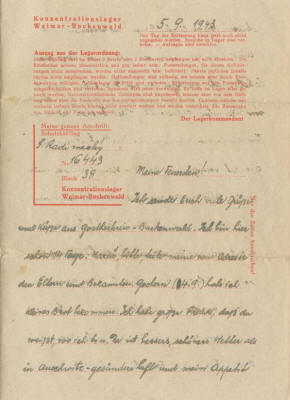1019301
Prisoner Letter from the Weimar-Buchenwald Concentration Camp
Click on image for larger size
"I have great joy that you know where I am. There is better, prettier weather than in Auschwitz—healthy air and my appetite is improving. . . . I firmly believe that I will celebrate the wedding with you . . . "
Autograph Letter Signed, Your father Stana, four pages, 5¾" x 8", with integral leaf, on inmate stationery of the Weimar-Buchenwald Concentration Camp, Weimar, Germany, September 5, 1943. In German, with translation.
This letter is unusual because the prisoner had been in the extermination camp at Auschwitz but was transferred to the perhaps safer Buchenwald—where, he says, the weather is better.
Auschwitz was the most notorious of the Nazi concentration camps. Upon arrival, prisoners judged fit to work were sent one direction, while the rest, including women, children, and the elderly, were sent directly to the gas chambers for execution. Those who became slave laborers for nearby factories were themselves worked to death. Auschwitz was also the site of the inhumane medical experiments of the infamous Dr. Josef Mengele. Altogether, more than 1.1 million people, 90% of them Jewish, died at Auschwitz.
Buchenwald was not an extermination camp, so this inmate's chances for survival there were better than at Auschwitz. Nevertheless some 56,000 people died at Buchenwald, due largely to starvation and disease but also to human experimentation and outright murder.
As the inmate notes, Buchenwald had a tie to Johann Wolfgang von Goethe, perhaps the most important German writer. Originally named ”Ettersburg,” Goethe used to meet Frau Charlotte von Stein there, under a beautiful old oak tree. Goethe's oak was inside the concentration camp perimeter. Its stump remains, close to the ruins of the camp laundry.
The inmate sends an upbeat letter to his family. He writes, in full: ”My beloveds! I send you many greetings and kisses from Goethe's district—Buchenwald. I have already been here 14 days. Marus, please give the parents and acquaintances my new address. Yesterday (Sept. 4) I got a little bread. I have great joy that you know where I am. There is better, prettier weather than in Auschwitz—healthy air and my appetite is improving. I received your last letter there. From the packages from you, the parents, and one acquaintance I got Christmas cake, apples, and sugar. Nothing else from the others. What you have sent me now is enough. When you can, send as much further. But look, first the children and then me! Do you really have no need? I do not know how long I will be here, so send larger packages now. I will write later about warm clothing. Send something to cook—I am a good cook—like Uncle Filip order Franta (meal, noodles, croutons, onions, etc.). I am sorry that you have so much work and worry. My thankfulness to you and the parents is greater from day to day. I kiss everyone in Kowlschin, I wish brother good luck and the parents rest. I firmly believe that I will celebrate the wedding with you and at the same time my harmonica will really work. Is it in the dry? Put my bicycle in the attic and take the tires off of it. Can you still not drive? I greet the Cijka family. Does he play the harmonica? Does Mr. Cizek take photographs so much? Has he made a new photograph of you all? Does Mr. Maska go bowling? I greet everyone! Dear children! You are again in school. Milosek, I will see that you learn. Be diligent, well behaved, and attentive. You, too, Stana! I pray for you all and hear your prayers. Write me something! My dear Marus! Be healthy, strong, patient! Your boy will come home again and will kiss you on the hands. Then our life will be nicer and happier. Write me immediately."
The writer of this letter was a slave, as appears from the printed word Schutzhäftling before his name in the return address. The word meant a “protected detainee,” one in "protecttive custody"—of the most notorious terms in Nazi law. Unlike a judicial prison sentence, protective custody was open ended and was administered by the Gestapo rather than by the courts. A victim was held at the Gestapo's pleasure.
This letter is in very fine condition. It has two normal mailing folds, with pinholes, not affecting the text, where the horizontal and vertical folds cross. There is a bit of ink bleed from the inside pages to the outside, but it does not detract.
Unframed.
_____________
This item has been sold, but
click here to see other
Holocaust and World History items
that we are offering.




